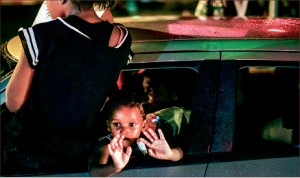Ferguson: trapped in terror

Tragedy in Missouri suburb sparks national conversation on racial equality
Odds are that most Americans had never heard of Ferguson, Missouri, a few weeks ago. But for the past few weeks, the small St. Louis suburb has been the epicenter of the American news cycle.

CONTROVERSY — Ferguson residents rallied in the streets of St. Louis in the wake of Michael Brown’s shooting. Google Images
Some of the events of Aug. 9 in Ferguson remain a blur, but there are a few things we know: Michael Brown is dead. He was unarmed, and he was shot six times by police officer Darren Wilson. Those are the facts. The blur occurs during the testimonies of eyewitnesses and the officer.
In the Ferguson Police Department’s initial statement, they declared that Brown had charged and assaulted the officer, who then fired in self-defense, killing Brown. Witnesses in the area told a different story in which Brown never attacked the officer, but was instead shot while holding his hands up in surrender.
For me, it is a little bit easier to believe eyewitnesses who have nothing to lose than a police department, which has terrorized its own citizens with tear gas and rubber bullets during the subsequent citizen protests. Everything about the way Ferguson and St. Louis police have handled the situation has seemed to be a cover-up from the beginning — whether it was no ambulance being called after the shooting or releasing a 19-page report on a “strong-armed robbery” case in which Brown was the main suspect during the same press conference in which the name of Brown’s shooter was announced.
What happened in Ferguson has shined a revealing light on an ugly zit of American culture. We do not live in a “post-racial” age. Sure, slavery and segregation are extinct, but black people and white people are still not treated as equals in many scenarios. A sliver of this problem has been exposed in Missouri — unequal treatment by police.
In Ferguson specifically, this has been a problem. According to USA Today, in a city where 67 percent of the population is black, only six percent of its police force is black. Blacks made up about 86 percent of Ferguson Police Department’s vehicle stops and 85 percent of its arrests this past year per FBI statistics.
Nationally, 37.1 percent of prison population is black when only 13.2 percent of the U.S. population is black. Those numbers mean something.
African-American Attorney General Eric Holder spoke in Ferguson several days after the shooting and acknowledged dealing with police discrimination throughout his life. He told a story of how he was stopped for “speeding” multiple times while living in New Jersey, only to have his car completely searched when stopped. Another time he and his cousin were stopped in Washington, D.C., simply for running along the sidewalk because they were late for a movie. The latter story occurred while Holder was a federal prosecutor. Holder firmly believed that the color of his skin was the primary, if not only, reason he was stopped on each of those occasions.
Did Darren Wilson shoot and kill Mike Brown because he hates black people and wanted him dead? Probably not, but it is a good bet that in his mind he felt more threatened by Brown because he was black. If Brown were white, Wilson probably would not have stopped him in the first place. I know it is dangerous to assume these things, but it was also dangerous for Wilson to assume it was okay to fire six bullets into the body of an unarmed teenager.
As a white man who lived in the rural South for a year, I have seen the backward mindset that had whites and blacks drinking from separate water fountains just a few generations ago. Growing up in a suburban area with a diverse culture, I was shocked when I moved to the country and heard my classmates casually use racial slurs to refer to black people. Some of them genuinely believed whites were better simply because of skin color. Sadly, this thinking still runs more rampant than anyone wishes to imagine.
Laws can be changed, but changing the way people think is a much more difficult task. History tells us that there will always be people who wallow in those backwards ways. But there is a difference between recognizing that reality and being okay with it.
Nothing can bring Mike Brown back, but perhaps his death will open some eyes and spark further change to bring America closer to true racial equality.
